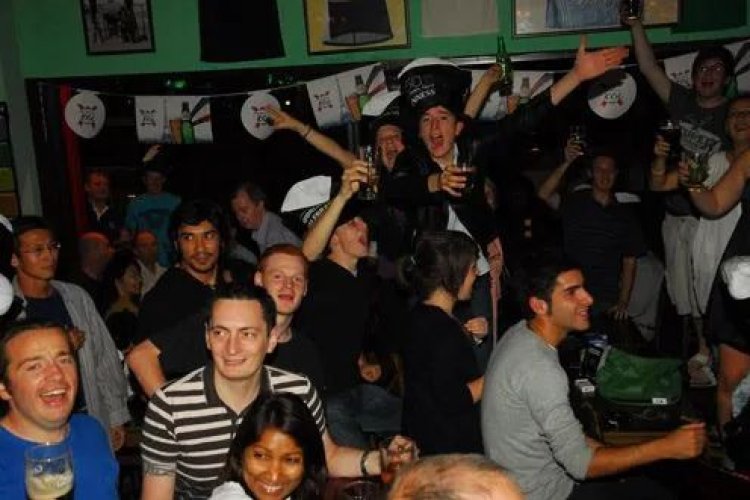Lights, Camera, Action!! 48 Hour Films Come to Beijing
The 48 Hour Film Project, started in Washington DC in 2001, challenges filmmakers to write, shoot, edit, and present a complete short film in just one weekend. The project has now spread to six continents, and it’s coming to Beijing on Friday, July 30. We sat down with Peter Sallade, the event’s organizer, to get the story on this world-famous filmmaking experiment.
What was your film background before the 48 hour film project? I’ve never been a director. I’ve done a little bit of editing work, I’ve worked on independent documentaries as a really lousy camera person, a fairly decent editor, and sort of a project-manager-co-producer. I basically made things happen.
At NYU, I went to the Interactive Telecommunications program, which is where I did most of my video work. It’s fitting that we’re talking in 798 because it’s a place where a lot of pretentious NYU graduates end up. I’ve dabbled in movie-making, but only now have I really gotten a chance to experience the full-on process. That’s a lot of what the 48 hour film project gives me – a chance to see a lot of different ways to make a movie in one weekend. Every team brings their own experience and their own methods to it, and you see there’s no one right way.
How did you get involved in the project? Who decided to bring it to Beijing? I’d heard about it every year, in some city somewhere. When I started doing the Beijing International Movie Festival, I had people come and say, “The 48 Hour Film Project really needs someone to start one in Beijing, why don’t you do it?”
In 2009 I finally thought “Ok, let’s try and do it!” We had a good team and I knew how it was supposed to run. It really worked out well because of the team. This year, some of those team members are back, some of the team members are new. So we’re just trying to sign up as many people as we can. We can sign up more people this year, because we’re more experienced with how to handle everything.
What are the basic rules of the Project? How many participants does the Beijing project usually have? You start 9pm on July 30, and within 48 hours you must make a four to seven minute short movie. It must include a required character, a required line of dialogue, and a required prop. That’s so you can’t get a jump start on everybody. And really, that’s about it. The following weekend we all get together and watch them.
Last year we had 15 teams sign up, 13 teams make it to registration, and 11 teams get movies in on time. We showed 13 movies – we showed the two late ones, saying “They didn’t come in on time, but we’re gonna show them, they worked hard on this.” About 300 people came. It’s exciting. It’s good for people with short attention spans.
Who tends to participate in the contest? Are all the participants professionals? Are amateurs at a disadvantage?
It’s mostly professionals, but they don’t have the advantage by any means. A lot of amateurs show up, and they can do just as well just by having a better story. It’s really “how do you get a good story,” and I think that depends on how well your team goes together.
You can have a team of amateurs, maybe four or five people, who are best friends and always do stuff together and are used to working together. But then you can have professionals who hate each other’s guts, so they never even turn a movie in on time.
Do you expect mostly Chinese filmmakers, mostly foreigners, or a mix?
[Last year] I was worried we’d get too many foreigners, but I was wrong. We got a mix of about seven or eight all-Chinese teams, and the rest of the teams were mixed, Chinese and foreigners. Everybody seemed to more or less get it, after our staff had sat down with them and answered all their questions. We said, “Please don’t over think it! Just go and do it!”
Is there anything distinctive about the Beijing films made in previous years, versus 48 hour films made in other cities?
Oh, totally. These movies are all things that you would only come up with in Beijing… we had a foreign team who were really big fans of this Chinese novel. So they’d taken inspiration from this gritty, real-life, hard-core, con-artist novel. They put this obnoxious foreign character and this obnoxious Chinese character, who are both these stereotypical extremes, together. They are each trying to cheat the other.
A friend of a friend’s father was in town, and they said, will you show up and be in this movie? “Yeah, I’d love to be in a movie!” It’s like this old gongfu guy, and this skinny guy with sunglasses, just this bunch of laobaixing, that show up and totally ham it up.
What’s the most difficult part of organizing this event in Beijing? Right now, the phase we’re in, just answering people’s questions. Trying to explain from the ground up, there’s no catch! You just make a movie in 48 hours! And some say, why would I want to do that? For some you can answer, “You can win an award.” For other people, “Because when it’s done you’ll have made this incredible movie you wouldn’t have made otherwise. You’ll think, ‘Wow, that was a real nightmare to make but I’m so happy we created this.’”
What’s the best part of the project? What have been some of your favorite experiences with it?
Watching the movies. It’s great, because there are a bunch of them, and each one contrasts with the others. Seeing all of these short films, curated together, it’s something out of nothing. It’s absolutely beautiful.
The 48 Hour Film Project starts at 9pm on Friday, July 30. RMB 500 per team. Want to get involved? Participants can register here: www.48hourfilm.com/beijing/english.php
The 48 Hour Film Project Screenings will take place from 6pm on Friday, August 6; Ullens Center for Contemporary Art (UCCA)






